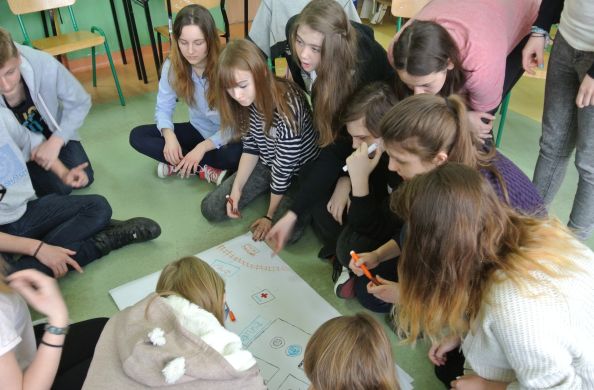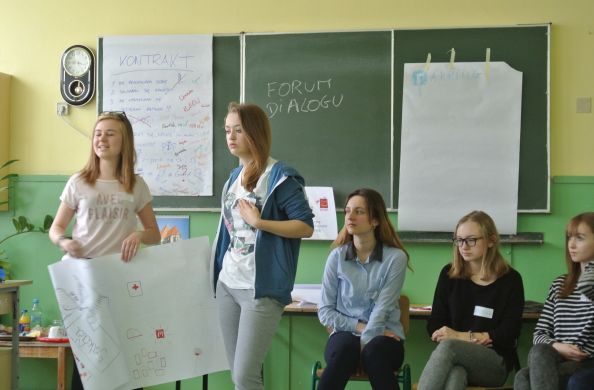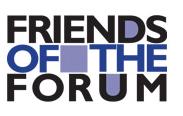| 2015 |
Kielce
Janusz Kusociński Junior High School No 16


| 2015 |
Kielce, the capital of the Świętokrzyskie Region, a difficult town. It carries the stigma of the Kielce Pogrom which overshadows the rich Jewish heritage. For many years now, various institutions have been operating here, many initiatives have been undertaken, all with the goal to restore the memory about the Jews of Kielce. There is the Jan Karski Foundation, the House of Memory at Planty Street, the Museum for Dialogue of Cultures and the Kielce History Museum where part of the permanent exhibit is devoted to Jewish history. There is a commemorative plaque in honor of the pogrom victims, an obelisk commemorating Jews from the ghetto in Kielce, a plaque in the memory of Mojżesz Pelc. The city tries to remember. But what the junior high students know about Jews? Do they only know that 42 Jews were killed by the Polish after the war?
During the School of Dialogue workshops, Forum educators talked about the early Jewish history in Kielce. The Jewish population lived here already in the 19th century. They were owners of many shops and factories. In 1917 Jews formed 30% of the City Council and in 1939, 30% of the town’s population was Jewish. The synagogue building was built in 1897 and still stands at Warszawska Street – it now houses the State Archives. On the same street, at No 18-20, the Jewish hospital was located. The wall paintings in the Herszl Zagajski house of prayer have been preserved till the present day. The building, where the former Jewish High School for boys and Stefania and Władysław Zimnowodów High School for girls were located, still stands. There is also Róża Minc school. Old movie theatres – Pantheon and Palace. And most of the houses where Jewish families once lived, at Sienkiewicza, Paderewski, Wolności, Orla, Kozia, Wesoła, Niecała and Hipoteczna Streets.


The students quickly improved their knowledge about the Jewish life before the war. They discovered a lot at the exhibit at the Kielce History Museum. There, they had the opportunity to ask many questions to Mr. Leszek Dziedzic who works in the Education and PR Department of the Museum. “In my opinion, these workshops are very helpful, they change our views about other cultures and religions, help us understand it. They show us that we are all equal and that a different religion does not make it impossible to be friends and understand each other”, said one of the workshop participant. “These workshops opened my eyes to the fact that we are all different but we are equal, and that race, religion or nationality are not important”, added another student.
Later, the students from Kielce had to undertake another part of the project – a walking tour, which they had to prepare on their own. However, timing was not on their side, as it was the end-of-year exam period.
What’s more, Kielce is rather large and it would be impossible to find each and every place connected with the Jewish history. Therefore, the group of students actively involved in the project, organized the walking tour at the Kielce History Museum and its area. The students guided a narrow group of tour participants through the museum rooms and introduce them to Judaism. The students also talked about the Jewish everyday life in Kielce, showing to the tour participants many objects connected with the Jewish community, which are displayed at the exhibit. They also mentioned the ghetto and the pogrom from 1946. After the walking tour, one of the participants, Laura, concluded “Thanks to this project I see the world differently. I became more tolerant”. If there is at least one person with such statement, the students project can be considered a success.

School:
Janusz Kusociński Junior High School No 16
Students:
2nd year students
Teacher:
Grzegorz Liebrecht
Expert:
Leszek Dziedzic
Educators:
Anna Desponds, Szymon Gotowski
In appreciation to the Conference on Jewish Material Claims Against Germany (Claims Conference) for supporting this educational program. Through recovering the assets of the victims of the Holocaust, the Claims Conference enables organizations around the world to provide education about the Shoah and to preserve the memory of those who perished.

Program co-financed from the funds granted by Citizens for Democracy program, financed through the EEA grants.

In appreciation to Friends of the Forum for supporting the School of Dialogue educational program.
